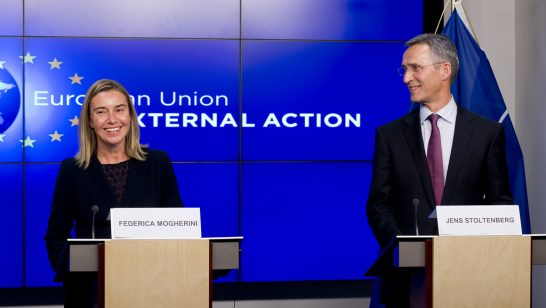
NATO and the EU have in the past few years made a great show of their burgeoning cooperation. EU Presidents Tusk and Juncker attended NATO’s Warsaw Summit in July 2016 and signed a Joint Declaration with NATO Secretary General Stoltenberg to “give new impetus and new substance to the NATO-EU strategic partnership”. Out of this came a set of 42 concrete proposals agreed by both organisations in December 2016. In December 2017, there was even more. The EU Council and North Atlantic Council endorsed a common set of new proposals, including a total of 34 actions for the implementation of the Joint Declaration. They also address new topics, such as counter-terrorism, military mobility and women, peace and security.
But there is something missing. The most practical and longstanding EU-NATO cooperative framework, so-called Berlin Plus, seems to have been overlooked. Under Berlin Plus, agreed in 2003, the EU can request NATO to make available its assets and capabilities to the EU for an EU-led and directed operation. From the absence of any reference to Berlin Plus in recent NATO or EU public documents, it would seem that this form of cooperation has been side-lined in favour of seemingly more contemporary issues. As a result, the list of NATO-EU activities does not address the challenge of how NATO and the EU would operate militarily together in a future crisis that affected both their interests.
It is time to recall the benefits of Berlin Plus. The operational, as well as the declaratory side, of the EU-NATO relationship is still important to the balance of trans-Atlantic relations. In the tangled history of US-Europe and NATO-EU relations, Berlin Plus appeared to offer a sensible compromise to resolve the inherent friction between US demands for its European allies to “do more” in a way that did not undermine NATO, on the one hand, and the ambitions of European countries to play a greater role in their own defence while lacking the means do so, on the other.
Since the agreement on Berlin Plus in 2003, circumstances have changed dramatically. Yet echoes of the old debates have recently re-emerged showing that the friction to which Berlin Plus responded still exists. US demands for more European defence spending are more exigent – yet its response to suggestions of EU military capability and autonomy echo suspicions of the past. The EU has realised the opportunity to become a serious actor in defence and security, but its ambitions remain as ever constrained by the EU’s absence of key capabilities, soon to be exacerbated by Brexit.
In all of this, the success and value of Berlin Plus has, it would seem, been quietly forgotten.
What is Berlin Plus?
The Berlin Plus arrangements allow the EU in a crisis to supplement its own military resources (largely drawn from EU member states) by drawing on NATO’s collective assets and capabilities. The arrangements fully protect the EU’s authority and political control in such an eventuality. There is a current practical example. The EU’s Operation Althea in Bosnia and Herzegovina is conducted under Berlin Plus arrangements. Its purpose, under UN mandate, is to help the Bosnian authorities maintain a safe and secure environment. NATO provides the communications, planning, and the command structure, and helps generate the forces. NATO’s Deputy Supreme Allied Commander, currently a UK 4-star General, is the Operation Commander. He is answerable solely to the EU for this function.
The arrangements are called after a 1996 NATO Foreign Ministers meeting in Berlin when they declared that they were willing to facilitate “the use of separable but not separate military capabilities in operations led by the Western European Union”. At their 1999 Washington Summit, building on the Berlin decision, NATO “acknowledged the resolve of the European Union to have the capacity for autonomous action” and effectively extended the arrangements to the EU. Hence the “Plus”. On behalf of the EU, Xavier Solana wrote to the NATO Secretary General George Robertson on 17 March 2003 confirming that the work on Berlin Plus between the two organisations had been completed.
The Sensitive Politics of Berlin Plus
Though operationally practical and mutually beneficial, any future Berlin Plus operation faces political obstacles, both within NATO and EU. First, Berlin Plus was set up at a time when the EU did not have sufficient crisis management means and capabilities. NATO’s support was considered a necessity then. Now, except for major operations, it is discretionary. The EU currently has six on-going military missions/operations, and ten civilian missions, with more than 4000 people deployed. There is a strand of EU thinking that perceives Berlin Plus, mistakenly, as past its sell-by date and belonging to a previous era of NATO-EU cooperation, where the EU was a dependent rather than an equal with NATO in security matters.
The second, more problematic, reason for the occlusion of Berlin Plus is the dispute between Cyprus and Turkey. Cyprus joined the EU in 2004, a year after the Berlin Plus arrangements were agreed. Henceforward, potential Berlin Plus operations have risked being held hostage to Greek-Cypriot-Turkish sensitivities. Turkey and Cyprus could exercise, in NATO and the EU respectively, vetoes on each other’s participation in a joint EU-NATO endeavour. So far, auspiciously, NATO-EU cooperation has managed to progress and intensify without Turkish or Cypriot or Greek vetoes. The important point is that Berlin Plus remains an agreed and, in Bosnia, functioning framework for the two institutions to work together in a crisis, irrespective of the sensitivities. If the crisis were severe enough and the interests of the NATO/EU strong enough, there would always be, and always has been, a means for the allies and EU member states to prevail over the concerns and objections of one or other NATO or EU member.
Berlin Plus – A hedge against the unforeseeable
Looking into an unpredictable and uncertain future, the Berlin Plus arrangements remain as valid today as when they were first agreed. Who knows when and where EU-NATO operational cooperation under Berlin Plus might be deemed diplomatically and politically useful? Moreover, some elements of Berlin Plus are irreplaceable, such as the EU having access to capabilities and assets which it does not have and not likely soon to acquire – and the EU’s military weaknesses can only worsen after Brexit.
The important point is that Berlin Plus remains not just a useful, but it is the only framework for NATO-EU operational cooperation in a crisis. The upcoming NATO Summit in July in Brussels will again give prominence to the progress and quality of NATO-EU cooperation. Another NATO-EU Joint Declaration is planned. This will be an opportunity to recall the continuing success of the EU’s Operation Althea, conducted under Berlin Plus arrangements. It will also be a key occasion for allies to reaffirm and validate Berlin Plus. The politically and operationally nuanced opportunities that Berlin Plus offers are a valuable addition to the NATO-EU toolbox. They should not be forgotten or wasted.
The opinions articulated above represent the views of the author, should not be attributed to any institution with which he is affiliated and do not necessarily reflect the position of the European Leadership Network or any of its members.



